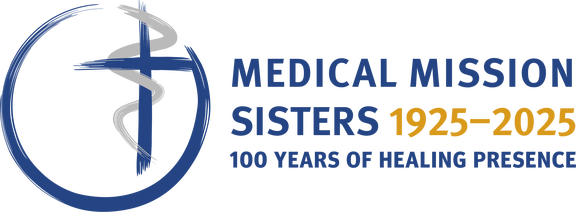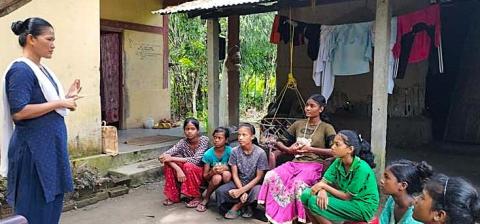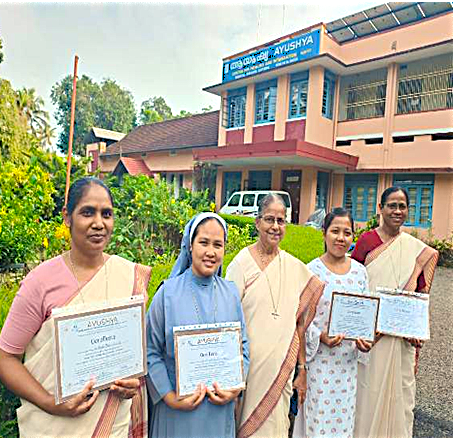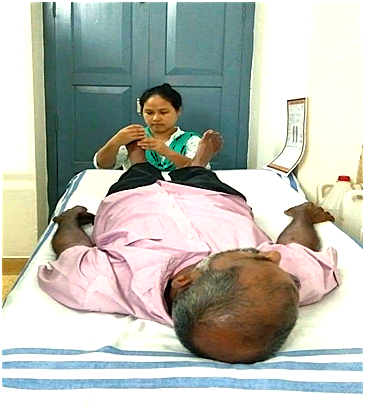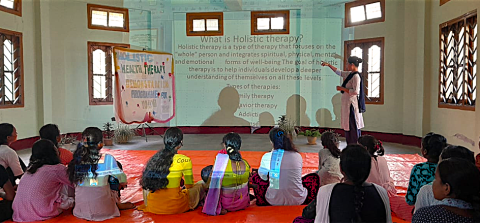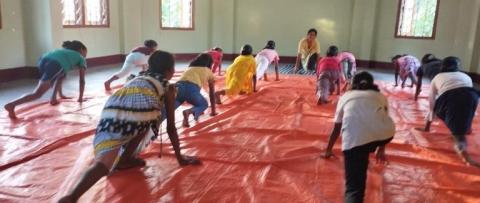Bringing alternative therapies to the Santal people in Assam State, North East India
Sister Anita Sangam sent the first of two reports on new activity in North East India.
She writes:
“Sundari is a place where three tribal communities - the Bodo, Rajbongshi and Santal - live. It is located in lower Assam State in the district of Chirang Bodoland Territorial Region, where the majority of the population belongs to the Bodos tribe. They and the Rajbongshi people are well settled and developed, whereas the Santal tribal community remains illiterate and lives mainly from earning daily wages. Many young boys and girls discontinue their studies and opt for early marriage because of a lack of parental guidance and understanding the value of education.
We, the Medical Mission Sisters, have been present in Sundari Village since 2006. Since then, we have offered programmes to raise awareness of the importance of education among adolescents in the villages. We also give training to improve health and hygiene. Generally, the Santal people have living conditions that need improving. In many households, for example, men turn to alcohol and often neglect the well-being of their family or children. Due to cramped living conditions and poor hygiene at home, many of the elderly people in the villages contract tuberculosis. We receive a lot of patients in our clinic whom we need to build up through providing medicine, treatments and nutritious food. Although sometimes progress feels slow due to a lack of local initiative, we continue conducting different programmes in Sundari and trying new approaches.
As Medical Mission Sisters, last year, we gained funding to start promoting alternative systems of medicine, designed to improve the health and well-being in the Santal communities. To take this project forward, we have been training two persons - one, a Medical Mission Sister, and the other, a local health worker. This is enabling us, alongside allopathic medicine, to introduce and practise alternative therapies which are in a great demand among the Santal people - especially, acupressure, massage, foot reflexology, cupping and herbal tonics.
Sister Margret Lyngdoh completed her studies at Ayushya Centre in Kerala, MMS’ centre for healing and integration, where she received a diploma in Integrative Healing and Alternative Therapies. Here, Sister Margaret was given a comprehensive overview of holistic health and wellness practices, with a special emphasis on how the body, mind and spirit are interconnected. The training had a focus on a wide range of topics, including an introduction to: a holistic approach to health; metaphysics, anatomy and physiology; reflexology; mindfulness; acupressure, psychotherapy; emotional body health; sujok therapy; auricular therapy; moxibustion; divine energy healing; stress management; herbal remedies - with visits to a herbal garden; care of the Earth; natural farming; healing techniques; and a healing camp. All of the classes gave Sister Margaret new information and knowledge which she has started to put into practice in Sundari since January 2025. She has also purchased equipment to help her to administer the new treatments. We are delighted that Sister Francisca Lakra, who also received alternative therapy training at Ayushya Centre, has now joined Sister Margaret and they are both busy applying their newly developed skills.
Through our visits to the local villages, we have started to raise local awareness of holistic approaches and the effectiveness of alternative therapies in improving health and well-being. We grow herbal plants in our community garden and are encouraging those whom we treat to plant them in their gardens, too, for therapeutic purposes. We now conduct a daily clinic in our centre and plan to gain feedback from our patients to demonstrate the effectiveness of our alternative therapeutic approaches. Every month, this will help us to evaluate progress with our local health worker.
A yoga programme takes place in our home for teenage girls and boys. So far, the sessions have proved very popular, and we will continue to teach yoga to the young people to help their development and well-being.”
In the longer term, Sister Anita is hopeful that the new programme will help MMS in North East India to collaborate with hospitals and other healthcare professionals in the region by offering them complementary therapies, designed to enhance patient care and health outcomes at a minimal cost.
For now, she expresses deep gratitude to the Diocese of Essen whose funding has enabled her and the Unit to develop this exciting, new strand of activity in Sundari.
